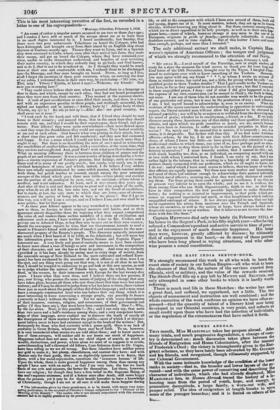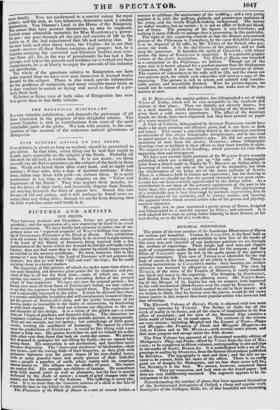HOMES ABROAD.
THIS month, Miss MARTINEAU takes her paupers abroad. .After many trials, and much progressive degradation,. a change of mem- try is determined on: much discussion takes place between the friends of Emigration and Home Colonization, after the manner of Frederick's Oord: the victory is triumphantly given to the En'- grant schemes, as they have lately been advocated by Mr. Gotrosa and his friends, and recognized, though villanously supported, bi our Colonial Government. With the same intimate knowledge of the condition of the lower ranks in society—that is, the broader and lower layeirs of the pY- ramid—and with the same power of conceiving and describing tlao character of individuals, whieh she had already displayed, MISS MART11SEAII has. in Homes AbroczA trees& the history of a la- bouring man from the period of youth, hope, and energy, to premature decrepitude, a large family, a worn-out wife, atia pauper relief. The idea of emigration at length breaks in upon some of the younger branches; and it is- forced on others of the saMe family. Two are condemned to a convict colony for rural crimes ; and the rest, as free labourers, determine upon a similar destination. Van Diemen's Land is the Home of the Emigrant. The scenes that here present themselves, as may be supposed, furnish some admirable materials for Miss MARTINEAn's power- ful pen : she goes through all the joys and sorrows of life in the desert, as if she had experienced that life and nothing else. In the new land, and after many trials, the Castles—for so are they named—recover all their former energies, and prosper; but, by a singular anomaly, the convicted and felonious brother soon over- tops them all ; for, in the way of punishment, he has had a free passage, and before his parents and brethren have worked out their engagements, he is at liberty to enjoy the proceeds of his industry and speculation.
The whole of the questions relative to Emigration are here better :argued than we have ever seen them even in learned works devoted to the subject. There is also much specific information for the guidance of emigrants, and many valuable moral hints as to their conduct in scenes so trying and novel as those of a per- fectly fresh land. No better or fairer view of both sides of Emigration has ever been given than in this little volume.




















































 Previous page
Previous page